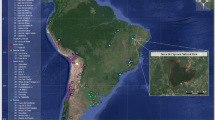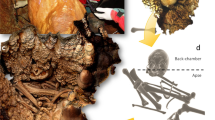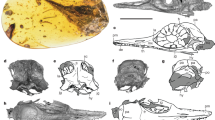Abstract
THE results of a carbon-14 collagen test performed on a portion of a long bone collected in association with the skull of a grizzly-type bear of the Ursus arctos–horribilis complex have just been received which indicate that this remarkably well-preserved specimen died some 11,700 ± 250 years ago. The specimen was discovered in a load of gravel removed from approximately 30 ft. below the local grade of a commercial gravel pit in November 1964.
This is a preview of subscription content, access via your institution
Access options
Subscribe to this journal
Receive 51 print issues and online access
$199.00 per year
only $3.90 per issue
Buy this article
- Purchase on Springer Link
- Instant access to full article PDF
Prices may be subject to local taxes which are calculated during checkout
Similar content being viewed by others
References
Deane, R. E., Geol. Surv. Canada. Mem., 256.
Terasmac, J., and Hughes, O. L., Science, 131, 1444 (1960).
Author information
Authors and Affiliations
Rights and permissions
About this article
Cite this article
PETERSON, R. A Well-preserved Grizzly Bear Skull recovered from a Late Glacial Deposit near Lake Simcoe, Ontario. Nature 208, 1233–1234 (1965). https://doi.org/10.1038/2081233a0
Issue Date:
DOI: https://doi.org/10.1038/2081233a0
Comments
By submitting a comment you agree to abide by our Terms and Community Guidelines. If you find something abusive or that does not comply with our terms or guidelines please flag it as inappropriate.



